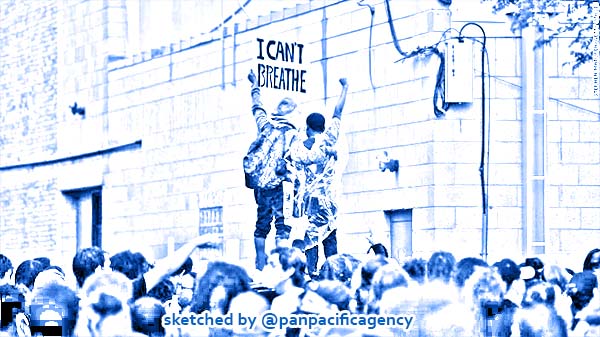US police reform: Trump signs executive order on ‘best practice’

A crowd protests the death of George Floyd outside a police precinct in Minneapolis on Tuesday. Photo: CNN. Sketched by the Pan Pacific Agency.
WASHINGTON D.C., Jun 17, 2020, BBC. US President Donald Trump has signed an executive order introducing several police reforms while rejecting calls to defund or dismantle the police, BBC News reported.
His order offers federal grants to improve practices, including creating a database to trace abuses by officers.
It comes amid anger over the police killings of African Americans, though Mr Trump did not comment about the ongoing US racism debate.
Several US cities have proposed more radical reforms.
Speaking at the White House on Tuesday, Mr Trump began by saying he had met a number of African-American families who had lost loved ones, including the relatives of Antwon Rose, Botham Jean and Ahmaud Arbery – the black jogger killed in Georgia earlier this year.
No representatives of the families were present with Mr Trump, who spoke while flanked by law enforcement officers.
What did Trump say?
In his address, the president again defended police while condemning looters and “anarchy”.
“We have to find common ground,” Mr Trump said. “But I strongly oppose the radical and dangerous efforts to defund, dismantle and dissolve our police departments.”
He added that “without police, there’s chaos”.
“Americans believe we must support the brave men and women in blue who police our streets and keep us safe,” Mr Trump said.
“Americans also believe we must improve accountability, increase transparency and invest more resources in police training, recruiting and community engagement.”
The latest drive for reform began after the death in police custody of George Floyd last month.
Mr Floyd died after a white police officer in Minneapolis knelt on his neck for almost nine minutes. The killing spurred global protests led by the Black Lives Matter movement.
There was fresh outrage after the death of another black man, Rayshard Brooks, who was shot during an attempted arrest in Atlanta last Friday.
What does the Trump order include?
The Trump announcement comes as Democrats and Republicans in the US Congress are developing reforms of their own.
The president’s executive order aims to provide incentives for police departments to improve by tying some federal grants to “best practices”.
It will create a federal database of complaints against officers. It will also encourage the deployment of social workers alongside officers to deal with non-violent cases involving drug addiction and homelessness.
The White House has stressed the idea is to bring the police closer to communities.
The order will also prioritise federal grants to departments that obtain certifications of high standards regarding de-escalation training and use of force.
“As part of this new credentialing process, chokeholds will be banned except if an officer’s life is at risk,” Mr Trump said. “Everybody said it’s time, we have to do it.”
The president said the government was looking into new “less lethal weapons to prevent deadly interactions”.
Mr Trump has described the Atlanta incident as “very disturbing”, and said his initiative was “about safety”.
The president has also condemned George Floyd’s death, but rejected suggestions of ingrained racism in police forces.
What do critics say?
Critics say the measures fall short of the deep reform that many are seeking.
Following the announcement, Senate Democratic leader Chuck Schumer called on lawmakers to pass bolder legislation.
“Unfortunately, this executive order will not deliver the comprehensive meaningful change and accountability in our nation’s police departments that Americans are demanding,” he said.
Top House Democrat Nancy Pelosi said the order “falls sadly and seriously short of what is required to combat the epidemic of racial injustice and police brutality that is murdering hundreds of Black Americans”.
“During this moment of national anguish, we must insist on bold change, not meekly surrender to the bare minimum,” she continued.
The president’s order also does not affect qualified immunity – a doctrine that protects government officials from being liable unless they violate “clearly established” constitutional rights.
Supporters of reform say the doctrine means police are not held accountable, but the White House has called the issue a nonstarter, and the Supreme Court on Monday also declined to review it.
Kristina Roth, a senior criminal justice programme officer at Amnesty International USA, said Mr Trump’s order “amounts to a Band-Aid for a bullet wound”.